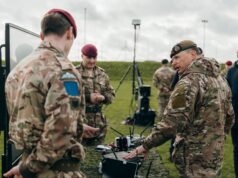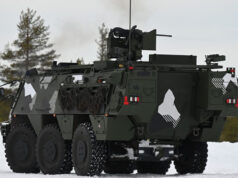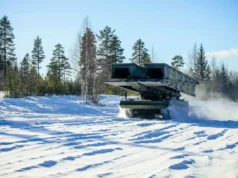In response to a written question from James Cartlidge MP (Conservative – South Suffolk), the Ministry of Defence has confirmed that recommendations from the Haythornthwaite Review on incentivising the Armed Forces, particularly for engineers and other essential skill groups, are being actively considered.
Al Carns, Parliamentary Under-Secretary for the MoD and Minister for Veterans, stated that “the Government is prioritising its response to the Armed Forces recruitment and retention challenge,” noting recent actions to modernise recruitment and deliver “the largest pay increase in over two decades.”
Carns explained that the recommendations from the Haythornthwaite Review are being incorporated into the MoD’s long-term planning and will be aligned with findings from the current Strategic Defence Review (SDR).
He added, “These include trials aimed at a wide engineering cohort, along with other measures to meet the needs of today’s Service people and their families.”
Armed forces recruitment falls short of targets (ukdefencejournal.org.uk)
This comes as a recent parliamentary response reveals that the UK Armed Forces have consistently fallen short of recruitment targets over the past five years.
The data, provided by the Ministry of Defence in response to a question from Rupert Lowe MP (Reform UK – Great Yarmouth), shows recruitment figures compared to targets for each branch of the armed forces, with particular focus on recent challenges faced by the Royal Navy, Army, and Royal Air Force.
Recruitment Targets vs Actuals (2019-2024)
| Financial Year | Royal Navy (Target) | Royal Navy (Actual) | Army (Target) | Army (Actual) | RAF (Target) | RAF (Actual) |
|---|---|---|---|---|---|---|
| 2019-20 | 4,190 | 3,520 | 10,110 | 9,590 | 2,900 | 2,970 |
| 2020-21 | 4,410 | 3,900 | 9,420 | 9,330 | 2,490 | 2,570 |
| 2021-22 | 4,350 | 3,550 | 7,360 | 7,230 | 2,670 | 2,620 |
| 2022-23 | 3,840 | 2,770 | 8,830 | 6,080 | 2,370 | 2,140 |
| 2023-24 | 4,040 | 2,450 | 10,450 | 6,720 | 2,560 | 1,800 |
The data highlights a growing shortfall in recruitment numbers for the UK Armed Forces, with 2023-24 showing a stark gap between targets and actual recruitment across all branches.
The Royal Navy met 60% of its target, while the British Army achieved around 63%, and the RAF saw the highest proportion of recruits relative to target, reaching 70% of its goal.
Branch-Specific Insights
The Ministry of Defence provided specific notes for each branch, shedding light on factors affecting recruitment:
- Royal Navy: Figures include Full-Time Naval Service personnel, such as the Royal Navy and Royal Marines, but exclude reservists and personnel on Full-Time Reserve Service. Targets focus on new entrants in Phase 1 training, excluding transfers or rank changes.
- British Army: The data reflects Regular Army recruitment only, excluding the Army Reserve, Gurkhas, and other reserve forces. The Army reduced its recruitment targets in 2020-21 and 2021-22 under its “Future Soldier” initiative, which focused on restructuring and modernisation.
- Royal Air Force: The RAF’s recruitment targets include both trained and untrained intakes. The branch has faced challenges due to external factors, including the Covid-19 pandemic and cost-of-living pressures, which likely influenced recruitment interest and intake.
Government Response and Planned Actions
In light of the recent recruitment shortfalls, the Ministry of Defence has stated that the new government prioritises improving recruitment and readiness across the armed forces. Luke Pollard, Parliamentary Under-Secretary, indicated that the Secretary of State has already made announcements aimed at enhancing recruitment efforts, with further measures to be unveiled.
Government announce huge changes to armed forces recruitment
The government’s response reflects a commitment to addressing recruitment shortfalls while modernising the force structure. The recent data underscores the challenges ahead as the Ministry of Defence seeks to attract and retain personnel amid evolving demands on the armed forces.
At the UK Defence Journal, we aim to deliver accurate and timely news on defence matters. We rely on the support of readers like you to maintain our independence and high-quality journalism. Please consider making a one-off donation to help us continue our work. Click here to donate. Thank you for your support!














AT LAST.
At last?
A delivery of a large word salad?
I don’t think this will fix the problem as that means spending a £Bn (on the back of my fag packet).
Maybe but the last few years,especially with Capita, have been shambolic. If Healey and co. are at least looking at improvements in recruitment, retention and skills we will have moved on. Now, whether the government are going to fund what is needed is a whole different ball game.
Exactly nothing new here move along. When they say large pay rise the truth is shelf stackers in supermarkets are on more than recruits.
It’s only two words and not the salad you speak of.
Pay and conditions.
Until they truly grasp that retention will keep dropping.
In the end it’s alway pay and conditions, but I would add one more..career pathway..pay and conditions get them in and keep them for a few years..but it’s a good career pathway that keeps the person over decades.
Why do you think the armed forces don’t have career pathways? I never thought this during my years of service. I have not noticed such comments in recent Continuous Attitude Surveys.
Clearly the career path is less than stellar for someone who doesn’t get promoted beyond a certain point and is then largely self-determined. Career paths can change if you choose to do something non-mainstream too.
It’s not that they don’t, clearly it’s there, but one thing you need to plan as part of your workforce management is career pathways. You should never have it baked into your structures and workforce that you loss experienced professionals ( unless you are awash with talent and can recruit experienced people off the street anytime)..if you have not planned your pathways well you to absorb your people then you end up losing and not having the very senior experience you need. The problem is compounded by shrinking services as they don’t offer the same long term pathway opportunities and if everyone can see that they jump ship…if all the deck officers know there are almost no command opportunities and their career is most likely to stall within 10-15 years then practically the entire workforce will be planing its exit mid career…that’s bad news.
I think there are some unique service factors to consider;
For starters there has always been the assumption in the armed forces that you’ll loose a considerable number of your work force. It’s backed into the force structure. You have 6 privates to 1 Lance Jack and 1 Screw in a section, clearly not all of those privates are going to get stripes. But that’s okay because in peace time there’s an understanding that a lot of those privates will want to pursue a civilian career after 4, 5, or 6 years, and in war time, more than a few of them won’t survive.
Ideally a shrinking service means a smaller base, so yes there’s shrinkage at the top, but you’ll also have shrinkage at the bottom too (hell in some cases shrinkage is reversed, SpecInf and SFAB (I think) saw a lot of low ranks getting culled, but senior enlisted ranks largely remaining (I could rant about the effects of that but I won’t).
But yes, there are choke points, but the choke points are distributed a bit weirdly, and they depend on your career path and unit, so, it’s quite hard to make service wide generalisations.
indeed I suppose it’s if you see your base workforce as expendable and replaceable, which lets be blunt historically soldiers were. I suppose the question to really ask is that still true in the 21c especially with a couple of key points.
1) no population of hardened and desperate poor to take up the ranks. ( the famous quote “we have in the service the scum of the earth” was still true in the 1930s when the much quoted Arthur Osbourne wrote “ the regular army had aways been a refuge for the man out of work, the man with no friends and no prospects”
2) increased complexity, are the skills of the modern soldier something that can really be mastered is such a short time that it’s cost effective to simply replace and retrain constantly.
because of these two points it’s probably a bit of problem if the modern armed forces are such that they have points that force service personnel out 4-5-6 years. It’s inefficient as you will have more less experienced people in increasingly complex roles and more active competition to recruit ( which is what we see in levels of recruitment)
This could be mitigated if you structured your population differently and infact you can see some modern European national service as a way to so so society engineer a population so it’s easy to recruit solders from it as needed.essentially the system in Finland is designed not to create a national service based army.but to instead have a massive base of instantly available recruited with a basic level of training already in place to a allow for an almost instant formation of an army.
Not sure the UK will ever want to do social engineering on the scale of Finland so it probably needs to do some serious work on retention and career pathways. In the end you don’t have to create pathways that are always based around promotion..it’s not just the army that has issues if you look at my field healthcare, you have a massive glass ceiling in the separation of professional staff from none professional staff. Not healthcare assistant can ever be more than a healthcare assistant unless they leave and qualify as a professional, but a good employer should structures a path for them that involves developing skills, roles and functions and ensures they can stay happy in that role and not have to leave. It’s even the same in the professional roles. There are .75 million nurses in the Uk, most of them 45% are staff nurses, They actually did a cohort study of newly qualified nurses after a decade and 21% were still at the same grade, 26 % were at band 6 but only 14% were band 7+ and and vanishingly small % were at very senior grades, the biggest group has simply left nursing 39%. When you consider it’s costs around 3 years and £70,000 to train a basic nurse and £12,000 to recruit each one of those lost staff nurses has a cost of three years and close to £100,000 ( which is really an understatement due to all the ongoing training costs).
retention is a difficult old game to be honest.
Career pathways are mostly linked to structure and career progression usually requires promotion, (but there are exceptions).
Simplifying a lot…. In a light role rifle platoon (ignoring Pl HQ) there would be 18 x Pte, all of whom probably want to promote to LCpl but there are only three LCpl slots to aspire to. It can take 4-5 years to get promoted to LCpl. Many of those who don’t get promoted to Lance Jack after 4-5 years are likely to decide to leave the army. A few will stay on.
A Private cannot generally just hang on for 6/7/8/9 years in the hope of being promoted. His chances diminish the older he gets.
Also, the army view is that soldiering particularly at the junior levels is physical and therefore is a young man’s game. Hence the reason for a max of a 22 year career for the non-commissioned.
Need to bin crapita
I quite agree go back to the old way
Absolutely. Bring recruitment back in house, properly funded rather than making a few rich shareholders & the whole exec gravey train richer at the nations expense.
Bring back national service for school leavers instead of them been sat at home or out breaking the law
Any specific examples of school-leavers “sitting at home or breaking the law”?
Or are you just going to sit there and accuse the entire population of under-18s of criminality and laziness?
I, for one, would enjoy doing national service, but it isn’t the be all and end all of my existence.
National service won’t solve the problem and just stops those who do want to go straight into the workforce from doing so. It also costs a significant amount of money to run and the infrastructure isn’t there.
I think a name change might be a decent idea. Perhaps instead of people being offered money to sit a home doing nothing they should be offered a job instead – one of which could be a role in the military. Might work.
Stop letting people leave at 42/44 after only 24 years, with all that experience, when half the WOs/SSgts, are fitter and more clued up then those what quit after 4/12 years.
I may be out of date but it was only ever the army that threw non-commissioned personnel out at age 40 after 22 years service, excepting for a few who served a few more years on the Long Service List. (now renamed). Many of those on the LSL were in ACIOs!
The army definitely needs to keep the Field Force for the under-40s, but there should be good roles outside the Field Force for a number of over-40 SSgts and WOs.
I am 45, can pass all my mandatory tests and are now employed on LSL (now called Senior Soldier Continuation Post), and are currently deployed on Operations. Believing that over 40s can’t operate in the field, comes from WOs from yesteryear and who didn’t do phys. We are losing too much experience, just down to age and length of contract. If youngsters quit, we’ll let them quit. It will save the said WOs hassle.
I quite agree. I deployed on Ops at 53 years old and was clearly the oldest man by far in Camp Bastion…but I was doing a staff job rather than a physical job, obvs.
Over-40s can certainly operate in the field.
Perhaps what many civvies don’t realise is how many officers and soldiers choose only to serve a short time, and leave as a young man or woman.
So we are continuing to waste vast sums of money on paying a private company to fail continually at recruitment. There’s no commitment to resolve service accommodation? Problems will get worse. Services are not respected or valued anymore
There needs to be reform on recruiting requirements in reserve forces. I’m late 30s and served previously, I left and then obtained a university education and chartership in my current engineering based field and operate at director level within a large multinational business. Apparently I’m not eligible to carry out my job in the reserves as I don’t have a GCSE in maths from when I was at highschool….. absolute joke. Obviously I won’t retake a GCSE in my 30s so they loose out on my support, one less recruited person. I wonder how many other competent persons they missed out on due to similar requirements?
They do that in a number of posts across government. You have teachers with a university degree, doing GCSE English. It’s entirely daft.
It’s hardly a major ask tho eh? A maths gcse. Couple of hours a week for 6 month.
Pretty sure if you don’t have a GCSE the army offers a Lvl 1 and 2 Maths and English course in training….it literally takes a week. I suspect Ned is just looking for an excuse not to sign up.
Also if he served previously he’d have had the opportunity to do both, and if he’d promoted would have had to do both.
Should be army colleges set up on bases where 16 to 18 can get all the skills and qualifications that is needed and when they turn 18 make a decision to stay or go.A percentage would stay this would help with skills and retention.Ones that leave would have qualifications and life skills for civilian life win win for both the government and armed forces.
It is the lack of innovative thinking such as this that is most evident. An ex-services male who came to do my annual gas safety check served seven years and left the army with a qualification and zero debts owed to student loans.
About time! Recruitment, retention. Equally crucial. If this government pulls this off, l will buy a hat to eat!
There have been retention initiatives sat with the Treasury for a year now, first with Hunt and now with Reeves, but neither of them have done anything with it – they just sit and watch the Forces haemorrhage experienced personnel.
One area the RAF fell short was stopping engineering apprenticeships.
As did the RN when it binned Tiffs.
Why on earth did they do that? How do young RAF technicians get initially trained now?
Much of the recruitment advertisements I see are aimed at visible minorities that evidence suggests don’t wish to join. There needs to be more innovation in the presentation of and pathways into service life.
Regarding British troops I’m seventy in August and I’m not a fit person doged with arthritis spondylitis could not pass a fitness test no way ,,but I can take orders I can shoot a gun and if my country needs a home guard kind of army even to go to war I’m your man I could drive something I was a brickie could help with dug outs or trenches or help build bunkers or something I’m willing and I’m sure there is many others just like me willing if the need comes god bless the British army best there is.
On a side note the government have come out and said when they will publish the pathway to 2.5% defence spending, it’s on completion of the defence review…so we have it we should know how committed this government are by the end of next summer.
Very interestingly Darren Jones from the treasury has stated “increasing defence spending would mean “trade offs” with other areas of public spending” .
Worried about the word ‘pathway’. Suggests a gradual ramp to reach that level, itself very modest.
Not surprised Jones mentions trade-offs. That is a truism.
indeed, better world would be plan..after all you need to have a plan to spend the money appropriately and many capital projects will be quite long term events.
To be honest I don’t love the whole percentage discussion. I’m a firm believer in setting out the “NEEDED” mission/requirement or demand then agreeing what capacity and capabilities you need to undertake or cover the demands, work out how much it will realistically cost to buy that, then assign the budget…then if there is any money left over you can spread it across what you want to do or have.or if you don’t have the money for the “NEED” you find a way to find the money.
I agree. The Services should have all the resources that they NEED to fulfill the missions that the politicos intend for them. Maybe they cannot have all the money they WANT, but should have all they NEED.
Same for me – I need a house, food and some transport. I would like a Ferrari but don’t need one!
Yes this is fundamentally the mistake made by the Cameron government during austerity. They went far to purist on reducing cost, forget the fundamental truth if you don’t pay for the things you need to have, the cost at the end is always higher. You should only ever cut back on the things you want. As an example you don’t pay for what your armed forces need to deter an enemy you end up at war and we know from history a successful deterrent many cost you 5% of your wealth but a general war with a peer will cost 30-40%, bankrupt you for decades and kill millions. You don’t pay for good required education, much of your future workforce is unable to function in a modern economy and you get massive levels of economic inactivity etc etc.. trouble is we are profoundly rubbish at identifying what is a NEED vs what is a WANT, infact most people cannot tell the difference…as a 6 foot+ active bloke need 800 gms of quality protein a day to maintain health muscle mass in middle age, I want a nice piece of steak or a chicken dinner.
Yep. We are on the same page!
It has to be said that the RAF want the Red Arrows, but they don’t need them.
Good luck. There are more than enough people who would be a good fit for the military. It’s just a question of finding them.
Engineers have had incentive payments for decades off and on.
Its a rubbish way of keeping people.
25 K to stay in for 5 years….Ill have some of that !
But wait…its taxed at the higher rate so straight away you lose 40% of it so its actually 15k in your pocket.
But there’s more.
Divide it by the number of years you need to stay inso you get 3k a year.
Thats 250 GBP a month or 8 pound a day…
Not so great now is it?
I was an engineering officer in the army for 34 years. Received no incentive payments and neither did our REME soldiers. What is the source of your info?
I think it tends to relate to the Navy, Graham . One of my mates was a submariner in an engineering role and he was offered all sorts of bonus to sign back up again, due to a lack of personal with that skill set
Ah, thanks Simon. Thought I had missed out receiving an exceptionally fat pay packet one year.
It does seem like anything that is currently put forward, will only make for a good PowerPoint slide and in reality make little difference. I’m absolutely sure that pay is one of the biggest barriers, as people compare military life to civilian life. If you give them a massive pay rise, then the rest of the public sector expect to follow. In recognition of the extraordinary sacrifice and risk taken by our armed forces, we need something particularly creative. Now let’s imagine I become the chancellor tomorrow I’d make the wages of anyone who serves tax free. With no income tax of NI deductions, every rank gets a very noticeable uplift, it aids retention as they would then have to move back into the tax world and finally it takes immediate pressure from the MOD budgets. The employer NI contributions saved could then be directed to improve the recruitment shambles.
Yes the HMRC takes a hit but a massive difference is made to our armed forces, at pace, without pouring in more money.
However I’m not the chancellor.
Basic pay isn’t really so much of an issue, for the majority it’s now fairly comparable with civilian industry. The main problems are pensions being changed and devalued, any perks being stripped away, fewer choices on where you can be posted to, and the fact that, in many cases, it costs a family money when the serving member is deployed. The last detachment I went on cost me and my family £3000, as my wife was left with the choice of not working, or paying out a fortune on childcare.
I hear that US forces get a housing allowance so they can rent a property ‘for free’….and that they have income tax waived if they are on deployed ops.
Thankfully!